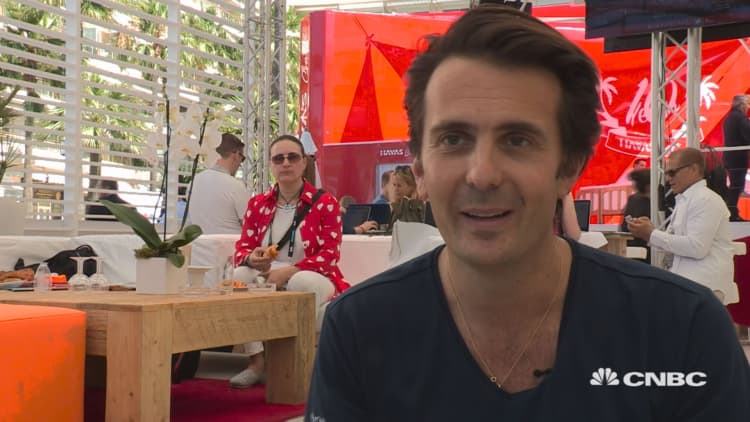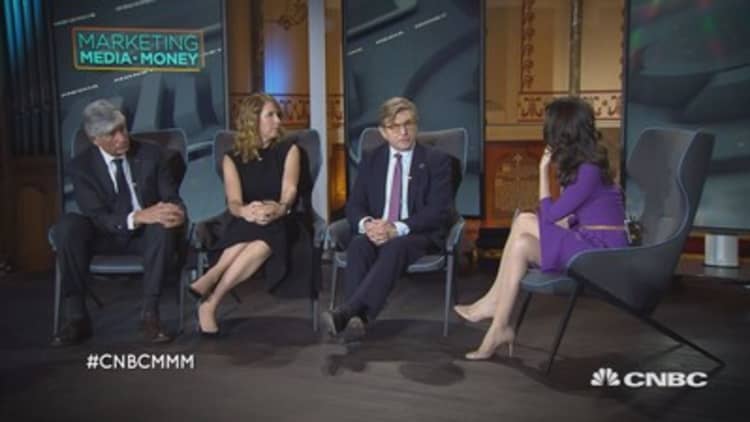What it means to be a leader has been in the spotlight lately, with Uber's chief executive Travis Kalanick admitting: "I need leadership help and I intend to get it," after an altercation with one of the company's cab drivers went public, and announcing that the business is looking for a new chief operating officer.
Then last week Airbnb Chief Executive Brian Chesky said leaders facing a crisis like Uber's should "Take a step back and have some humility." So what does it mean to be a leader in an age where business models are being disrupted and media is becoming more fragmented?
"You have seen businesses like Uber, five minutes ago it's up on a pedestal as this incredible disruptive business, and 10 minutes later and suddenly it's a dreadful misogynistic environment. You look at leadership and think that has to be the fault of the person that's in the top job," said Paul Frampton, U.K. and Ireland chief executive of Havas Media Group, speaking on a CNBC panel at this week's Advertising Week Europe festival in London.
Get out of the ivory tower
Frampton said he sees a trend towards relationship-driven leadership, rather than a "command and control" style.
"I think old-school leadership has been very masculine and that has been quite d
ominant, it has been top-down, quite uncollaborative, and I think we will start to see that change to more feminine values of leadership… conversational, relationship-driven, I think those things are a lot more important," he told CNBC anchor Carolin Roth at the event.
Rachel Forde, CEO of agency Mediavest, advocated hiring a team that you can learn from. "You've got to be empathetic, listen, take feedback, I want my team to be better than me, I want them to want my job but we are always in that learning mindset where we are not always right," she said.

Havas recently merged all of its London offices into one 11-floor building in Kings Cross, and has also got rid of "media" and "creative" labels.
"We have just collapsed media and creative and we are trying to work out what that means, and it's the right thing to do, but obviously it creates some confusion. Some people are a little bit unclear about what it means and leadership is then about reassurance and it's about creating a clear direction and saying: we're going over there," Frampton said.
Be a risky business
As well as being directive, leaders also have to encourage bravery, said Forde.
"We tell our clients they have to innovate, they have to test and learn, so it's a mindset and it can't be for the sake of it. If we're not innovating or evolving, we are standing still. I don't think we should live or work in an environment where they can't do that. Again it's not this command and control."

For Karen Stacey, the chief executive of Digital Cinema Media, risks are now quicker to take, and correct if necessary.
"In our house [with] my daughter, we always say "don't say no, have a go." You can respond very quickly. Arguably, it is easy to be brave now, whereas years ago you were [saying], let's go to 14 boards, and then there would be a lot of money spent on that, but we can do things quicker now so we should be doing more."
Taking risks is part of surviving the media industry, said Mark Eaves, founder of content agency Gravity Road.
"I just think that it's very evident to see organizations that aren't pushing it. It is a massively competitive industry and is massively over supplied. It's fairly self-selecting if you're not pushing, it's kind of a necessity and I think it's about being confident, playful [and] mischievous. [But] the implications of making a mistake can be quite significant," he said.
Go for diversity
While young people can be seen as trend-setters, leaders should aim for having a mix of experiences in their teams, Eaves added, Gravity Road having hired chair David Pattison, in 2012.
"The way we fetishize youth and newness in our industry it is at the expense of wisdom sometimes. It's right to have people in those businesses who hadn't done it before. We didn't know what we were doing, were looking for a chairman… [but] we [as an industry] undervalue wisdom generally."


